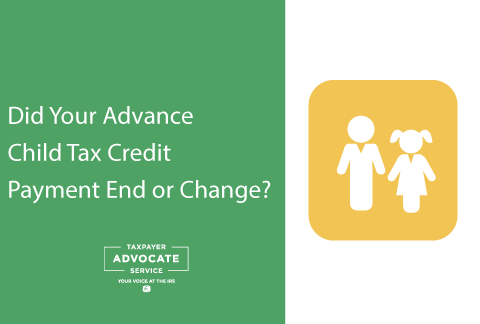If your advance Child Tax Credit (CTC) payment ended in, or changed for the month of October, it may be because you mistakenly received advance CTC payments. The IRS provided some potential reasons for the change in a statement released on October 29, 2021. The IRS reports that changes relating to the reasons outlined in that statement affected approximately 220,000 people, or less than 1% of advanced payments.
Advance Child Tax Credit payment changes reflected in October:
- Changes to children’s age: The IRS identified you as a taxpayer who appears to have mistakenly received advance CTC payments, based on IRS account information, for children who are too old to qualify for payments.
- For those who were erroneously receiving payments for a child who is 18 or older at the end of 2021, those payments have been stopped. This could be due to the IRS’s processing of a 2020 tax return, where the original qualification information from a 2019 tax return, is now changed by the updated information. See the IRS’s FAQs for more information on who is a qualifying child.
- Child claimed by multiple people: If a qualifying child was claimed on more than one tax return in the same tax year, advance payments have been stopped for those children. See IRS FAQs Topic M: Commonly Asked Shared-Custody Questions for more detailed information.
Here are some of the other reasons that a change may have occurred since payments began in July:
- Unenrollment requests: Unenrolling at any time would stop payments. For example, if you used the Child Tax Credit Update Portal between August 30 and October 3 to unenroll from these payments, that would have become effective for the October 15th payment, causing it not to be issued to you.
- If you were married filing joint in 2020 (or 2019 if the IRS had not finished processing your tax return before July) and only one of you unenrolled subsequently, the remaining spouse would get half of the amount of joint payment you were supposed to receive with your spouse. See IRS FAQs Topic J: Unenrolling from Advance Payments.
- Account information changes: If only one spouse used the Child Tax Credit Update Portal to make a change to bank account information or provided an address change, this may have resulted in payments being split into two (between the existing account or address and the new account or address).
- In some of these cases, the split payment caused a delay in making payments, and further caused individuals to receive slightly more than the correct payment in September. To address this, the payment that each spouse receives in October, November, and December will be reduced slightly to adjust for the overpayment.
- In addition, if the address on your account changed, either due to a written or oral statement, by an entry using the Child Tax Credit Update Portal, or per a newly processed tax return or amended tax return, that may affect your advanced payments as well. For instance, if the newest information now shows a U.S. Territory address instead of a U.S. domestic address, your payments may have been stopped because part of the eligibility for the credit requires that you must have your main home in one of the 50 states or the District of Columbia for more than half the year.
- Processing of a 2020 tax return: IRS’s recent processing of your 2020 individual tax return changed the IRS’s original eligibility assessment and calculation. See IRS FAQ Topic D: Calculation of Advance Child Tax Credit Payments for more information.
- Prior to July 2021, if the IRS had not yet processed your 2020 tax return yet, they determined your eligibility and the amount of your advance CTC payment based on information shown on your 2019 tax return. Once the IRS completes the processing of your 2020 return, at any time later in 2021, they then recalculate your advance CTC payments and adjust any remaining monthly payments (to reflect an increase or decrease). This could also include adjusting or stopping payments if the information shows you no longer qualify.
- Amended tax returns: The filing of an amended tax return (Form 1040X) can also freeze your account until the IRS can process the amended tax return. This is because this type of return can change anything you reported originally, such as income figures, addresses, dependents claimed, age of dependents claimed, and much more. All of these items can affect the eligibility for the credit.
- IRS Examination/Audit: An examination of your tax return information can also freeze your account until the IRS completes its work.
- Other possible reasons: There still may be other situations that can stop these advanced payments, such as indications of identity theft associated with one or more of the taxpayers listed on the tax return, or invalid/ incorrect social security numbers provided for dependents claimed on the return.
If you find that you did indeed receive advance payments in error, you can return any erroneous payments, and/or reconcile the final amount of CTC on your 2021 individual income tax return, when you file in 2022.
More resources
Taxpayer Advocate Service
IRS

